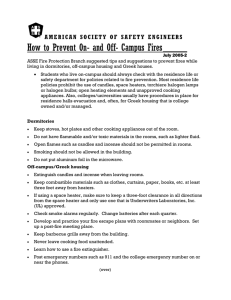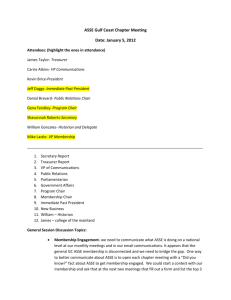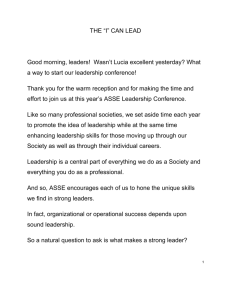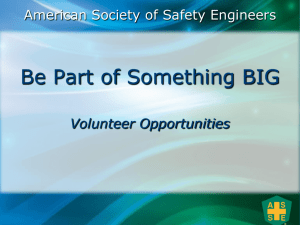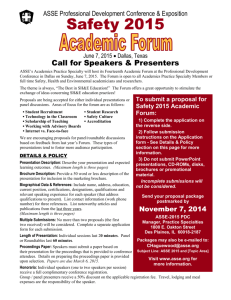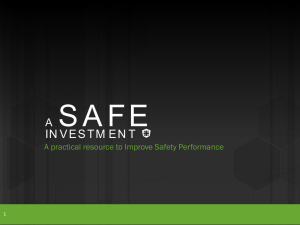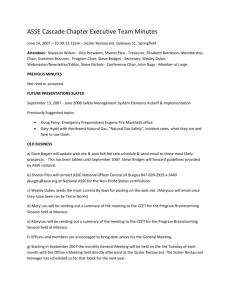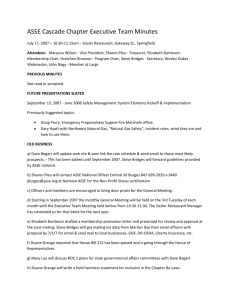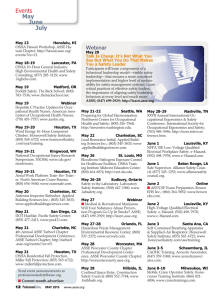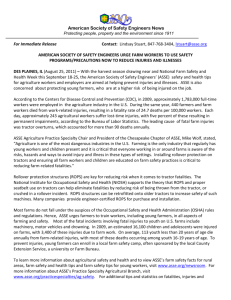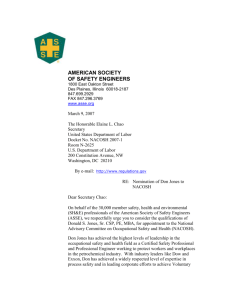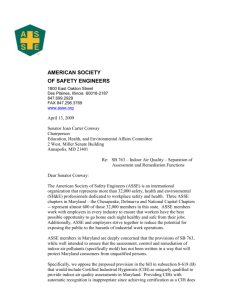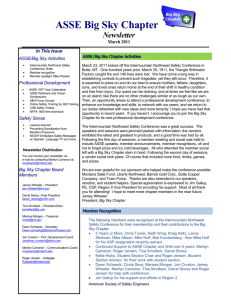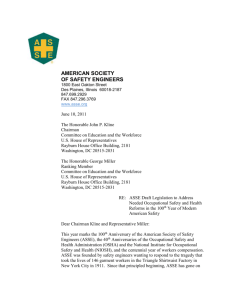What Is A Safety Professional? - American Society of Safety Engineers
advertisement
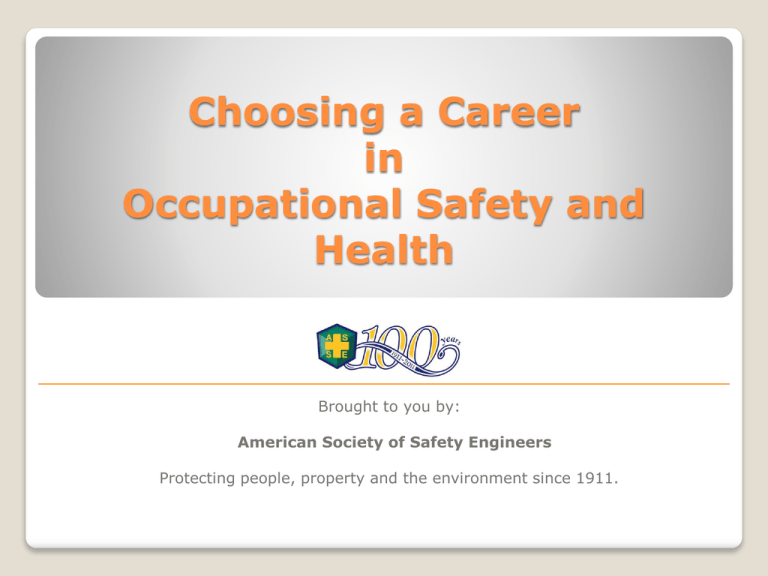
Choosing a Career in Occupational Safety and Health Brought to you by: American Society of Safety Engineers Protecting people, property and the environment since 1911. How Did the Occupational Safety and Health Profession Begin? The Triangle Shirtwaist Fire Saturday, March 25, 1911 The Triangle Shirtwaist Fire On March 25, 1911, a fire broke out at the Triangle Shirtwaist Factory on the 8th, 9th and 10th floors of the Asch Building in New York City. 146 women and men who worked sewing ladies’ blouses were killed because of unsafe working conditions, broken fire escapes and locked exit doors that prevented workers from escaping. The American Society of Safety Engineers In October of 1911, the American Society of Safety Engineers (ASSE) was founded to address occupational safety and health issues, while protecting people, property and the environment. People began focusing on the safety of workers and businesses began to recognize the need for professionals who could help identify hazards and develop solutions to keep workers safe. ASSE and its more than 32,000 members around the world still work to this day to make sure that millions of workers go to work and return home injury and illness free each day. What is the Occupational Safety and Health Profession? Safety, health and environmental (SH&E) professionals prevent harm to people, property and the environment by applying principles from engineering, education, psychology, physiology, enforcement, hygiene, health, physics and management. SH&E professionals use appropriate methods and techniques of loss prevention and control and work in all industries worldwide. What is Safety Science? Safety science is the term used for everything that goes into the prevention of accidents, illnesses, fires, explosions and other events that harm people, property and the environment. Areas of safety science include: ◦ ◦ ◦ ◦ ◦ ◦ ◦ Chemistry and Biology Physics Ergonomics Environmental Sciences Psychology Physiology, biomechanics and medicine Engineering, business management, economics, sociology and geology What do SH&E Professionals Do? SH&E professionals have many roles and responsibilities and do at least several of the following: Hazard recognition Inspections/Audits Fire protection Regulatory compliance Health hazard control Ergonomics Hazardous materials management Environmental protection Workers’ compensation Training Accident and incident investigations Advising management Record keeping and evaluating Emergency response Managing safety programs Product safety Security Planning, engineering out risk Where do Occupational Safety and Health Professionals Work? SH&E professionals work in a wide range of sectors, including manufacturing, transportation, mining, government, schools and hospitals. Examples of companies that employ SH&E professionals include Disney, NASA, Hasbro, Sara Lee, Kraft, GM, CNA, AON, Madison Square Garden, GE, Chevron, Nike, CBS, Toyota and many other companies. Industries Where SH&E Professionals Work Based on a 2008 study by the Board of Certified Safety Professionals (BCSP), SH&E professionals work in the following industries: ◦ 38.3% in manufacturing ◦ 18.8% in Insurance and Finance ◦ 10% in Professional, Scientific and Technological Services ◦ 8.8% in Public Administration and Government ◦ 8.4% in Construction ◦ 5.2% in Mining ◦ 5.1% in Utilities Choosing Occupational Safety and Health as a Career Choosing occupational safety and health as a career path can be very rewarding. The field is expected to grow by 9% in the next ten years. Salaries range from approximately $30,000 to $150,000+ for highly qualified individuals. The personal rewards from knowing that you help people return safely home each day, injury and illness-free will be a wonderful testament to the importance of your job! How You Can Get Involved While you’re still in school, there are many things you can do to prepare yourself for a career in occupational safety and health. You Can: ◦ Learn about ASSE Chapters and Student Sections in your area, attend meetings and talk to SH&E professionals about their careers. ◦ Order copies of the free ASSE “Your Guide to a Career in the Occupational Safety, Health & Environmental Profession” brochure by contacting customerservice@asse.org or downloading it from the www.asse.org/newsroom/ site under press kit. ◦ As you learn about incidents and disasters in the news, think critically about how these could have been prevented. ◦ Do a science project on worker safety and health, traffic safety, fire prevention, etc. ◦ Check out ASSE’s NexSteps career resources at www.nexsteps.org to view SH&E job openings and learn about what positions are available in the field. Choosing a College Program If you decide the occupational safety and health profession is for you, the next step is to choose a college program. Consider SH&E degree programs from accredited colleges and universities. For more information on higher education accreditation of school that have SH&E programs, you can visit: ◦ ASSE’s listing of colleges that offer degrees in safety and related programs at www.asse.org ◦ The Council for Higher Education Accreditation at www.chea.org ◦ The U.S. Department of Education at www.ope.ed.gov/accreditation ◦ The Accreditation Board for Engineering and Technology (ABET) at www.abet.org. The American Society of Safety Engineers Founded in 1911, ASSE is the oldest professional safety society with more than 32,000 occupational safety, health and environmental professional members worldwide. For more information and a copy of our free “Guide to a Career in the Occupational Safety and Health Profession,” please visit www.asse.org/newsroom for an electronic version or contact ASSE Customer Service at customerservice@asse.org. ASSE is celebrating it’s 100th Anniversary as a Society in 2011. Please visit www.asse.org for more information about upcoming events and ways you can get involved! LS PR 9/2010
